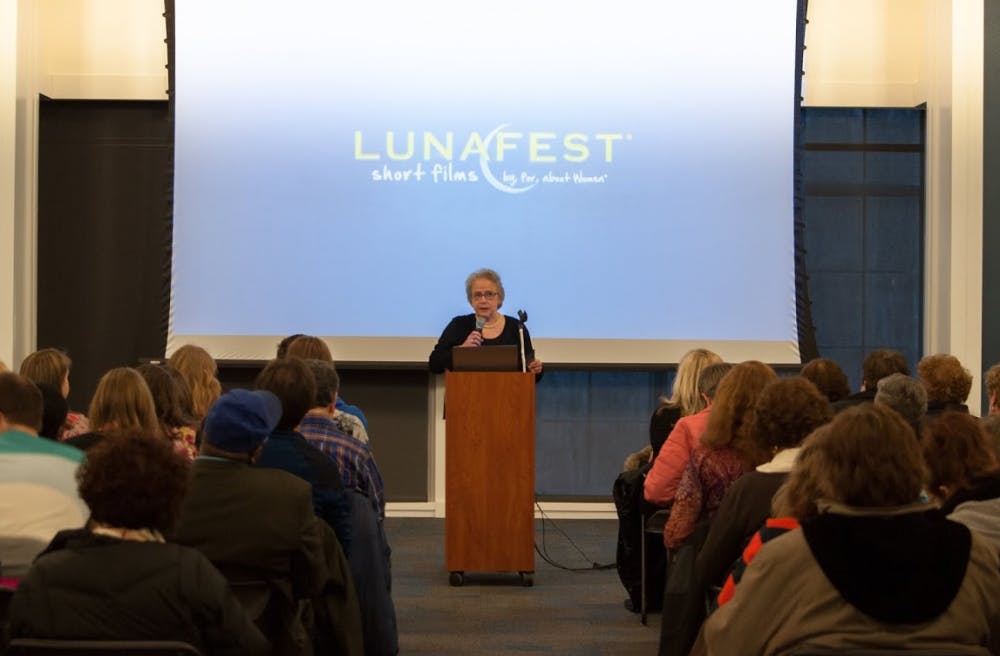Not “The Good Seventies,” not even “The Great Seventies,” but rather “The Fabulous Seventies” — a seven-woman basketball team that has competed in several national championships for over 19 years — had their journey, which has been rewarding but difficult at the same time, featured at this year’s Lunafest. The short-film festival by, for and about women was held at the College on Friday, March 28.
With seven 70-something-year-old women competing in the physical sport of competitive basketball, there are bound to be a few obstacles.
These seven inspirational women were featured in the first short-film documentary of the night, “Granny’s Got Game.”
“I miss the camaraderie, I love seeing my friends,” said “The Fabulous Seventies” team player who was forced to watch from the sideline due to the negative effects of her Polio diagnosis as a child. “It’s been the highlight of my life.”
Several organizations on campus helped make the night a success.
“You are sustaining and advancing your community,” said R. Barbara Gitenstein, president of the College, introducing the night’s event. “I’m proud of the students, faculty and staff doing a wonderful job ensuring your wonderful work continues.”
One hundred percent of the proceeds go to the Lunafest’s 2014 local beneficiary, Sage Girl, a non-profit organization that provides girls and women with positive programs in the local community. Out of every dollar raised through Lunafest, 15 percent goes to the Breast Cancer Fund.
Lunafest’s values of celebration, connection and community have reached over 150 cities, according to the Lunafest trailer in the inception of the night. All of the nine films of the night highlight the struggles women face and the strength women build overcoming their obstacles.
“We are thrilled to be a part of this project,” Gitenstein said. “It brings light to issues in this community that affect women.”
Proceeding “Granny’s Got Game” came a Netherlands documentary, “Flying Anne,” depicting the life of 11-year-old Anne, diagnosed with the brain disorder Tourette’s syndrome. Though Anne struggles to fight her impulses of twirling, licking and blinking, she gathers the courage to present a project to her class, explaining her tics and compulsions.
“If I had the choice, I wouldn’t get rid of Tourette’s because I would stop being me,” Anne said.
“Sidewalk,” an animated short film, illustrated the changing body of a woman and the confusion and frustration that accompanies the adjustment. This film in particular, having several funny moments, received many laughs from the audience. The protagonist of the story ultimately finds happiness and peace as she aids a young girl with the journey of her own physical maturation.
A fictional film depicting a young girl’s first co-ed wrestling match, “First Match,” taught the audience the lesson of self-confidence and self-encouragement in unequal-gender environments, such as sports.
“I’m interested in short films,” sophomore communication studies major Gail Schulman said. “I like how athletics are involved — it’s very cool.”
A dominantly black and white sketched short film, “Sound Shadows,” was next.
“Maria of Many” demonstrated the life of Mexican immigrant Maria, a devoted mother, activist and domestic worker. “I don’t want (my daughter) to be like me,” Maria said. “I want her to be better than me.”
Maria’s commitment to her domestic and activism work is to ensure a better future for her daughter.
In the Athens-located short film “Running Dry,” the protagonist begins with constantly switching the radio that essentially states the economic ruin Greece is in. The short film soon switches to a classic black and white silent film, showing the protagonist spare her last dollars to help the members of her community.
The short film finally reverses back to color and sound as she soaks in herself in an in-ground fountain, with the children of Athens playing and splashing beside her.
“Date With Fate” initially begins with a middle-aged man and woman separately filming an online profile for a “matchmaker” type of website. To their extreme displeasure, they are matched on a blind date with one another and speak for the first time in years. The funny banter between the exes had the audience in a comical uproar.
“People say magic happens everywhere, but it has to start somewhere,” said Sam, the protagonist of the last short film “Tiny, Miny, Magic.”
Sam and the mailman begin exchanging small gifts through her mailbox and a romantic relationship seems to blossom.
At the end it is revealed that the mailman in fact likes Sam’s male roommate. Sam tells her roommate about the mailman’s admiration and smiles as he decides to give the relationship a try.
In addition to the nine short films offered through Lunafest, artwork was on display courtesy of the National Art Honor Society at Maple Shade High School and 2008 College alum Jen Braverman.
An additional short film, “The Bechdel Test,” created by sophomore communication studies and interactive multimedia double major Folake Ayiloge, was also shown. The film portrayed the difficulty of passing the Bechdel Test: at least two women on screen talking about something other than men.
As the girls solved their difficulties by writing a script without the discussion of men, the girls tell the audience, “Be conscious of the test, does it (the movie) pass? Next time you are watching a movie, think.”
“There is so much information in such short films,” sophomore communication studies major Becky Corn said. “I really like how it’s just for women. It’s a good cause.”
Women leadership, independence and confidence were certainly prevalent themes of the night.
“We don’t like to lose to anybody, any reason, any time, anywhere,” a “The Fabulous Seventies” team player said. “You got to defend yourself if you don’t somebody else is gonna push you around.”
“If something happens to one,” another “The Fabulous Seventies” player said, “it happens to us all.”







